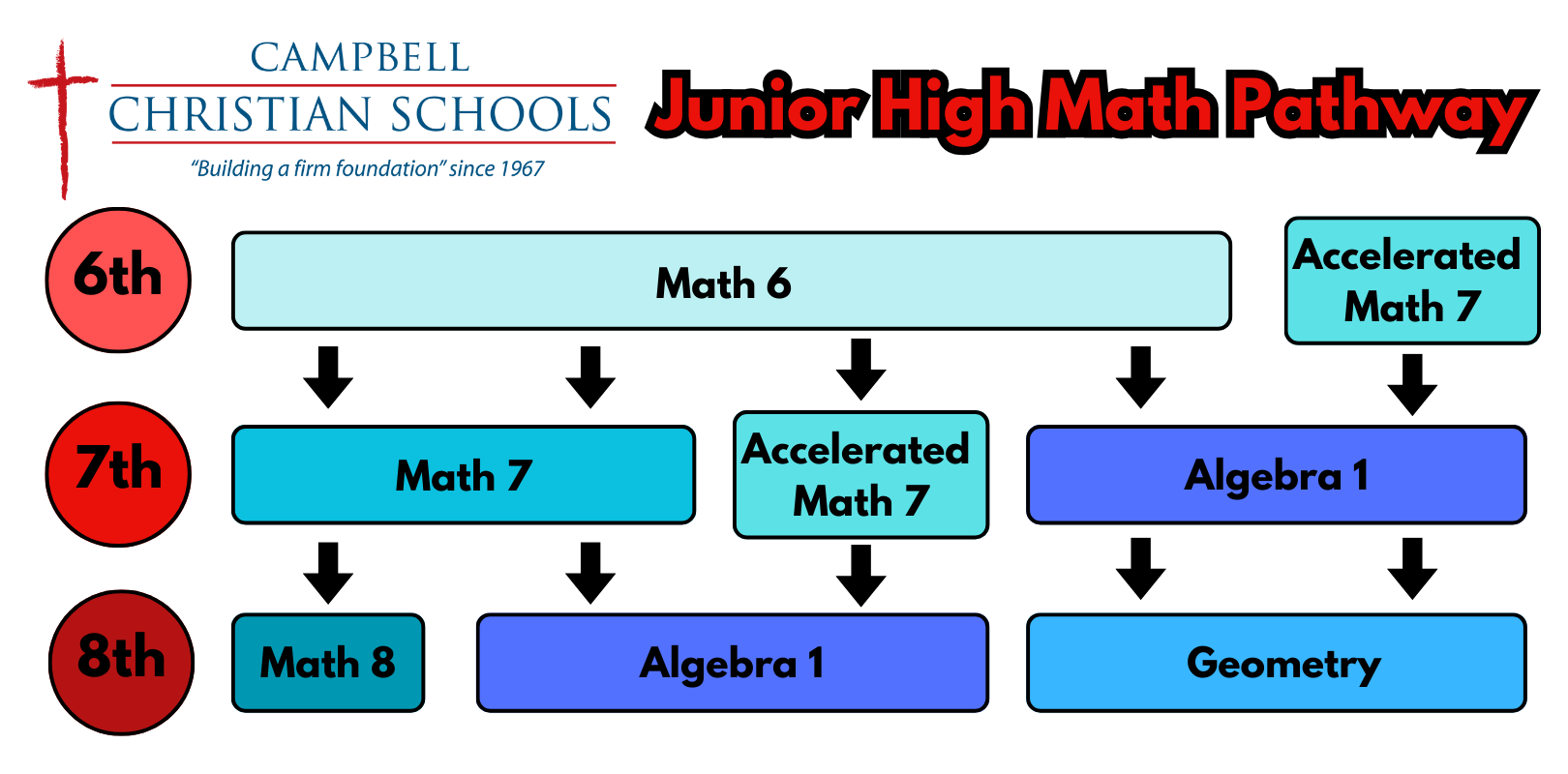 Campbell Christian Schools
Campbell Christian Schools
Curriculum
Curriculum
CCS uses carefully considered criteria for choosing our Junior High curriculum.
A curriculum selection committee that included teachers, school administrators, and an independent university curriculum professor analyzed California State Academic Standards, National Common Core Standards, and Next Generation Science Standards in order to choose the best available curriculum for each subject. Textbooks are chosen that provide a balance of enriching activities and core subject material integrated with technology, biblical truths and critical thinking skills
Core Subjects
Mathematics
6th Grade students are placed in one of two leveled math classes Math Grade 6 or Accelerated Math 7. The curriculum used is McGraw Hill, Reveal Math Course 1 or Accelerated Math 7. These follow Common Core standards.
7th Grade students are placed in one of three leveled math classes: Math Grade 7, Accelerated Math 7 or Algebra 1. The curriculum used is McGraw Hill, Reveal Math Course 2, Accelerated Math 7 or Algebra 1 . These follow Common Core standards.
8th Grade students may be placed in one of three leveled math classes: Math Grade 8, Algebra 1 or Geometry. The curriculum used is McGraw Hill, Reveal Math Course 3, Algebra 1, or Geometry. These follow Common Core standards.
As we assess our students every year, there are five different paths their math journey at CCS may lead:

History
Junior High history classes use the engaging digital TCI History Alive! curriculum. Each lesson starts with an essential question and incorporates note-taking skills, group collaboration, primary source analysis, student discovery, and projects. History Alive! The Ancient World: As 6th grade students explore the great early civilizations of Egypt and the Near East, India, China, Greece, and Rome, students discover the secrets of these ancient cultures that continue to influence the modern world. History Alive! The Medieval World and Beyond: 7th grade students explore the legacy of civilizations from Europe, Africa, the Middle East, Asia, and the Americas. History Alive! The United States Through Industrialism immerses 8th grade students in a powerful journey through the history of the United States from its foundations to the age of industrialism. This class provides a context for their spring trip to Washington D.C.
Language Arts
At CCS we use StudySync, a complete English Language Arts curriculum designed to meet the rigorous academic needs of today’s classroom. To cover this material, each student has a literature and a writing class. StudySync’s unique blend of contemporary and classic literature comes together with the program’s rigorous reading routines to dynamically instruct students toward mastery. StudySync's vast, ever-growing digital library of over a thousand classic and contemporary, fiction, and non-fiction selections allows students and teachers to access diverse characters and points-of-view through in-depth studies of texts. Skills lessons ensure students build foundational language and comprehension skills, as well as reading, writing, and research on inquiry skills. Extended Writing Projects (EWPs) guide students through the process of writing multi-paragraph essays in a variety of forms. Explicit writing instruction through a combination of writing process and skill lessons, guide students through the stages of planning, drafting, revising, editing, and publishing. StudySync Blasts capture students’ imaginations with short read/write assignments addressing real world topics. StudySync media is designed to amplify student voices, foster collaboration, and elevate the level of academic discourse. Embedded opportunities for self-reflection and collaboration builds social-emotional learning while students set and achieve personal goals, while also working with their peers.
Novel studies may include: Hatchet, The Lightning Thief, Roll of Thunder Hear My Cry, Freedom Walkers, The Hobbit, The Giver, Harriet Tubman, The Outsiders, Lord of the Flies, Diary of Anne Frank, Tom Sawyer, and The Narrative Life of Frederick Douglas
Science
The Next Generation Science Standards have raised the engineering design process to the same level as scientific inquiry. The Houghton Mifflin Harcourt Science Dimensions curriculum is built around active learning and encourages students to solve problems or explain phenomena by stating claims, gathering evidence, and providing explanations through reasoning. Hands-on labs, peer collaboration, and meaningful technology use form the building blocks of learning in Earth and Space Science, Life Science, Physical Science, and Engineering. An additional biology lab that focuses on anatomy and dissection is open to 7th and 8th grade students as an elective.
Bible
All junior high students have daily devotionals in their homeroom, which provides the opportunity for students to support one another and grow deeper in the walk. In addition, junior high students attend 24 chapel programs throughout the school year. Chapel programs include a time of worship and singing and a variety of speakers that teach lessons relevant to the students’ lives, as well as offering opportunities for the students to develop their leadership and communication skills by presenting at chapel themselves.
6th grade uses the DeepRoots Bible to deepen students’ faith roots by encouraging a love for Jesus, building godly character, and cultivating critical thinking as students move into junior high.
As 7th-grade students experience more independence, they find that their new freedoms are followed by greater responsibility and higher expectations. Wise Up! Wisdom in Proverbs, published by Positive Action for Christ, encourages students to grow spiritually and display wisdom, both at school and at home.
8th-grade students use Positive Action for Christ’s Route 66, which takes students through a fast-paced survey of the entire Bible. Students also have daily devotions in their homerooms and attend chapel programs twice a month.